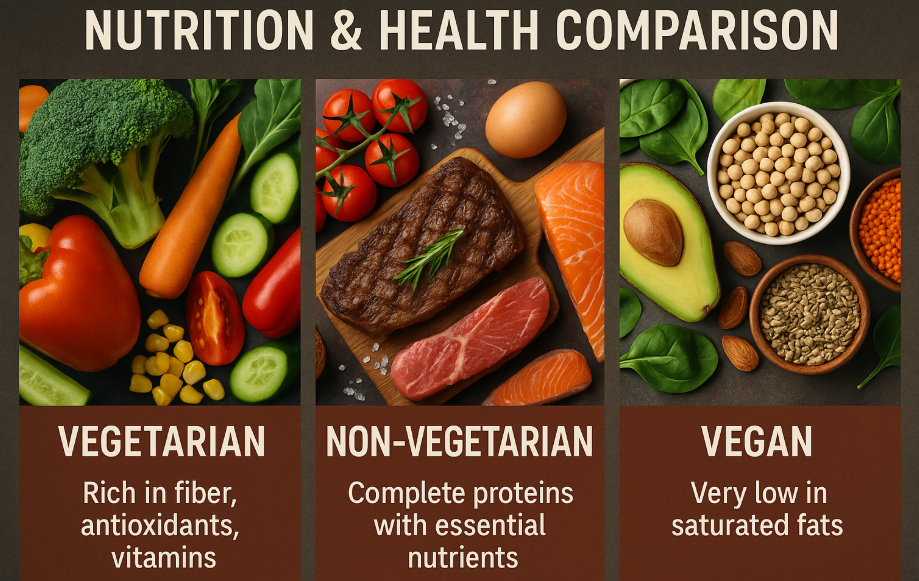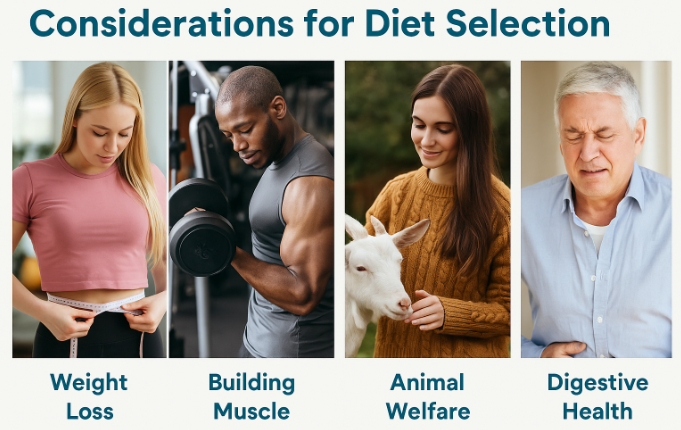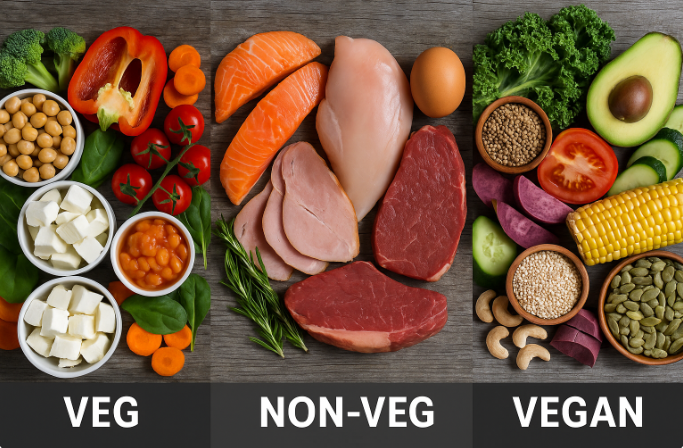Table of Contents
Veg vs Non-Veg vs Vegan Diet
Introduction In today’s health-conscious world, choosing the right diet can be overwhelming. From plant-based vegans to meat-inclusive eaters, everyone claims their path is the healthiest. But which one truly supports long-term health, vitality, and sustainability? This comprehensive guide compares the vegetarian, non-vegetarian, and vegan diets across nutritional value, health benefits, environmental impact, and ethical considerations.
1. Understanding the Diet Types
Vegetarian Diet: Includes plant-based foods, dairy products. Excludes meat, poultry, and seafood.
Non-Vegetarian Diet: Includes both plant-based and animal-based foods such as meat, fish, poultry, eggs, and dairy.
Vegan Diet: A stricter form of vegetarianism that excludes all animal products including dairy, eggs, honey, and any food derived from animals.
2. Nutritional Profile Comparison
a. Macronutrients
- Vegetarian: Typically balanced in carbohydrates and fats; moderate protein intake through dairy, legumes, and soy.
- Non-Vegetarian: Higher in protein due to animal sources; fats can be higher depending on meat type.
- Vegan: High in complex carbs and fiber; protein from legumes, tofu, seeds, nuts, and whole grains.
b. Micronutrients
- Vegetarian: May lack vitamin B12, iron, and omega-3s if not monitored.
- Non-Vegetarian: Rich in B12, iron (heme iron), zinc, and omega-3 (especially from fish).
- Vegan: Risk of deficiencies in B12, iron, calcium, vitamin D, and omega-3 unless supplemented.
c. Fiber and Antioxidants
- Vegan and vegetarian diets typically offer higher fiber, antioxidants, and phytonutrients compared to non-vegetarian diets due to high fruit and vegetable content.

3. Health Benefits and Risks
Vegetarian Diet
- Benefits: Reduced risk of heart disease, type 2 diabetes, certain cancers, and obesity. Promotes gut health and longevity.
- Risks: Potential for nutrient deficiencies (especially B12, iron).
Non-Vegetarian Diet
- Benefits: Provides complete proteins and high bioavailability of essential nutrients.
- Risks: High consumption of red and processed meats linked to heart disease, cancer, and inflammation. Saturated fat and cholesterol levels may be higher.
Vegan Diet
- Benefits: Lower body mass index (BMI), reduced risk of chronic diseases, very low in saturated fat, and high in antioxidants.
- Risks: Greater risk of vitamin and mineral deficiencies, requires careful planning or supplementation.
4. Environmental and Ethical Impact
Vegetarian: Has a lower carbon footprint than meat-based diets. Dairy industry still contributes to emissions and animal welfare concerns.
Non-Vegetarian: Highest environmental impact due to animal agriculture, water use, deforestation, and greenhouse gas emissions. Ethical concerns regarding animal welfare and factory farming.
Vegan: Most environmentally sustainable. Minimal animal exploitation. Ethical and compassionate towards animals.
5. Lifestyle, Accessibility, and Practicality
Vegetarian: Easy to adopt in many cultures, especially in countries like India. Variety of options, moderate reliance on animal products.
Non-Vegetarian: Offers wide culinary variety and access to high-quality protein. May be easier for bodybuilders and athletes.
Vegan: Becoming more accessible with rising plant-based alternatives. May be challenging in traditional diets or when dining out.
6. Scientific Studies and Evidence
Numerous studies support plant-based diets:
- A study in the Journal of the American Heart Association found that plant-based diets lower the risk of heart disease by 32%.
- Harvard Health reported lower cancer risk and longer life spans in vegetarians and vegans compared to meat-eaters.
- However, studies also show that non-vegetarians who consume lean meats, fish, and vegetables can maintain good health if their diet is balanced and portion-controlled.
7. Supplementation Needs
- Vegetarians: B12, iron, omega-3 (if not consuming fish), and possibly vitamin D.
- Vegans: B12 is essential. Other supplements may include iron, calcium, vitamin D, and omega-3.
- Non-Vegetarians: Typically fewer supplementation needs, though high meat intake may warrant fiber or heart-health-focused nutrients.
8. Common Misconceptions
- Myth: Vegan diets are protein-deficient. Truth: Adequate protein can be achieved with legumes, soy, nuts, seeds, and grains.
- Myth: All non-veg diets are unhealthy. Truth: Diets rich in fish, lean poultry, vegetables, and whole grains can be very healthy.
- Myth: Vegetarian diets are automatically healthy. Truth: Deep-fried vegetarian snacks, sweets, and over-reliance on dairy can lead to health issues.
9. Which Diet Is Right for You?
Choosing the “right” diet—be it vegetarian, non-vegetarian, or vegan—is deeply personal. It’s not just about what’s on your plate, but why it’s there. Let’s break down the key factors to consider when making your decision:
Considerations:
- Health Goals: Weight loss, muscle building, disease prevention?
- Moral/Ethical Beliefs: Animal welfare, sustainability?
- Medical Needs: Food allergies, digestive issues, chronic conditions?
- Cultural & Social Factors: Ease of meal preparation, family eating patterns.

1. Health Goals
Your personal health objectives can play a major role in deciding which diet suits you best:
- Weight Loss: Vegan and vegetarian diets are typically lower in calories and fat, which can help with weight management. A whole-food plant-based diet, rich in fiber, can keep you full longer and reduce cravings.
- Muscle Building: Non-veg diets provide complete proteins (like chicken, fish, and eggs), which can be easier for some to build muscle. However, many athletes successfully build muscle on vegan diets using lentils, tofu, tempeh, seitan, and plant-based protein powders.
- Disease Prevention: Vegan and vegetarian diets are often linked with lower risks of heart disease, high blood pressure, type 2 diabetes, and certain cancers. Non-veg diets that emphasize lean proteins and omega-3-rich fish (like in a Mediterranean diet) also show strong disease-prevention benefits.
2. Moral & Ethical Beliefs
Your personal beliefs and values are perhaps the most compelling reasons people choose a specific diet:
- Animal Welfare: Many people adopt veganism due to concerns over animal cruelty and industrial farming practices. Vegetarianism often aligns with similar beliefs but still allows dairy and eggs from humane sources.
- Environmental Sustainability: Vegan and vegetarian diets generally have a smaller carbon footprint, use less water, and create less pollution. Non-veg diets, especially those heavy in red meat, contribute more to greenhouse gas emissions and deforestation.
- Spiritual & Religious Values: In India, for example, vegetarianism is often tied to religious practices in Hinduism, Jainism, and Buddhism. Understanding and respecting these ethical considerations is essential.
3. Medical Needs
Some health conditions might demand specific dietary restrictions or adaptations:
- Food Allergies: Vegan diets eliminate common allergens like dairy and eggs, but they may include soy or nuts, which some people are allergic to. Non-veg diets might offer more protein variety for those with plant-based food allergies.
- Digestive Issues: High-fiber vegan diets might cause bloating or discomfort for people with IBS or certain gut conditions. On the flip side, dairy in vegetarian or non-veg diets may aggravate lactose intolerance.
- Chronic Conditions: People with anemia might find it easier to get heme iron from non-veg foods, while those managing high cholesterol may benefit from avoiding animal fats altogether.
Consulting with a nutritionist or doctor before making a drastic change is always recommended.
4. Cultural & Social Factors
Finally, your social environment and lifestyle can greatly influence your ability to maintain a diet:
- Ease of Meal Preparation: Non-veg meals may require more cooking time and food safety considerations (e.g., handling raw meat). Vegan meals, especially whole-food based, can be quicker and simpler but may need more planning for balanced nutrition.
- Family & Social Eating Patterns: If your household follows a traditional non-veg diet, switching to veganism might require adjustments in meal prep and family dynamics. On the other hand, if your culture predominantly favors plant-based foods, vegetarianism or veganism might feel more natural.
- Dining Out: In some regions, it’s easier to find non-veg or vegetarian meals at restaurants than vegan options. Accessibility plays a big role in long-term adherence.
✅ Final Thought: Personalization Is Key
There’s no one-size-fits-all answer. Your ideal diet should align with your goals, values, health conditions, and lifestyle. The best diet is one you can sustain joyfully—one that nourishes both your body and your beliefs.
10. Conclusion
There is no one-size-fits-all answer. The healthiest diet is one that is:
- Whole-food based
- Balanced in macronutrients
- Rich in fruits, vegetables, and fiber
- Moderate in fats and protein
- Low in processed foods and sugar
Whether you choose vegetarian, non-vegetarian, or vegan, the quality of your food, variety, and nutritional awareness matter the most. Consult a nutritionist for personalized guidance and regularly monitor key nutrients if you follow a restricted diet.
Call to Action
Ultimately, a conscious eater—who eats with mindfulness, ethics, and health in mind—is always healthier than one who follows any label blindly.
Take the First Step Toward a Healthier You
Your health is your most priceless asset—don’t leave it to guesswork or trends. Whether you lean toward vegetarian, non-vegetarian, or vegan, what matters most is making informed, mindful choices that nourish your body and soul. Start today. Look at your plate. Does it reflect the life and energy you want? Choose consciously. Eat with love. Heal from within. 🌱❤️
Ready to transform your diet? Begin your journey now—your future self will thank you.
References:
- Harvard T.H. Chan School of Public Health: Nutrition Source link
- Journal of the American Heart Association link
- WHO – Diet, Nutrition and the Prevention of Chronic Diseases link
- Academy of Nutrition and Dietetics Position Papers link
- Plant-Based Health Professionals UK link
Want to know what is Balanced Diet? Click here. Get to know the health benefits of Antioxidants here.

1 thought on “3 Powerful Diets: Veg vs Non-Veg vs Vegan Diet – Which Shape’s Your Health Better?”
Comments are closed.